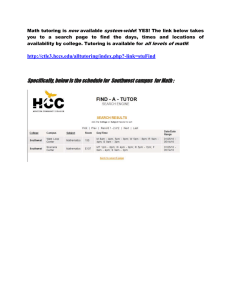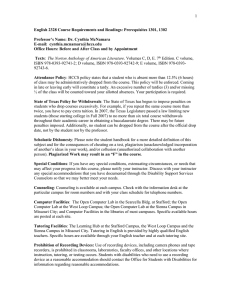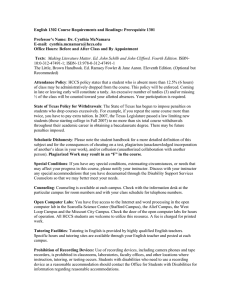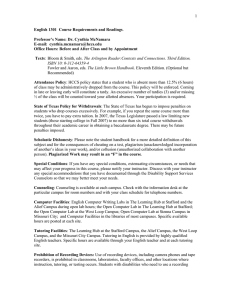2327Syllabus.F.11.doc
advertisement
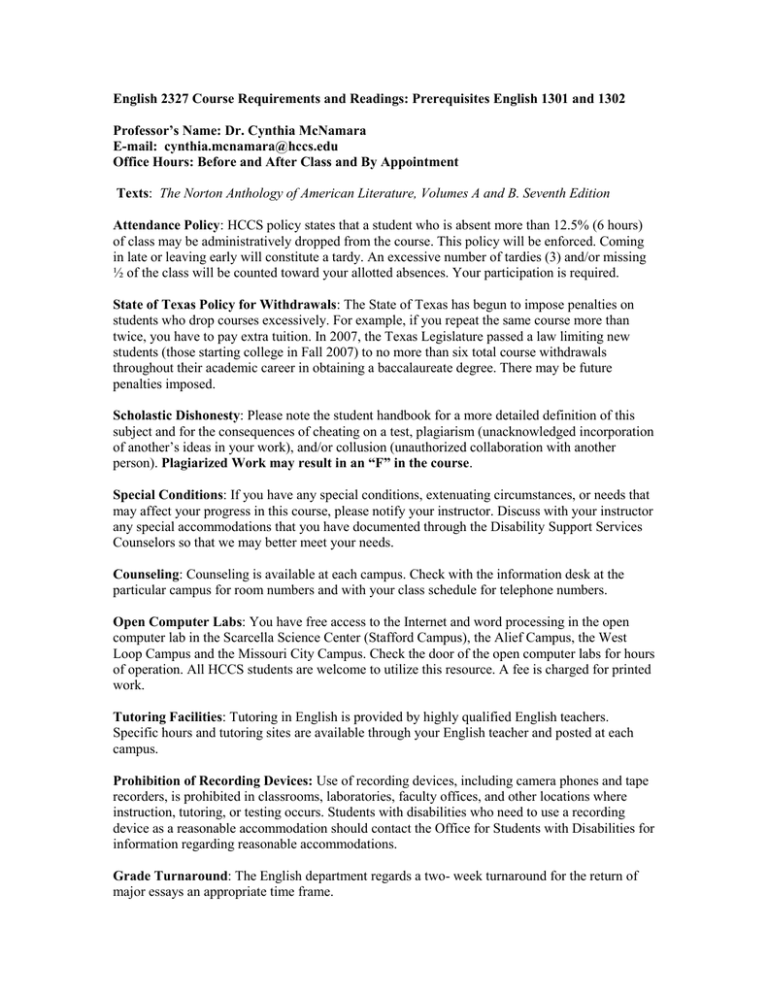
English 2327 Course Requirements and Readings: Prerequisites English 1301 and 1302 Professor’s Name: Dr. Cynthia McNamara E-mail: cynthia.mcnamara@hccs.edu Office Hours: Before and After Class and By Appointment Texts: The Norton Anthology of American Literature, Volumes A and B. Seventh Edition Attendance Policy: HCCS policy states that a student who is absent more than 12.5% (6 hours) of class may be administratively dropped from the course. This policy will be enforced. Coming in late or leaving early will constitute a tardy. An excessive number of tardies (3) and/or missing ½ of the class will be counted toward your allotted absences. Your participation is required. State of Texas Policy for Withdrawals: The State of Texas has begun to impose penalties on students who drop courses excessively. For example, if you repeat the same course more than twice, you have to pay extra tuition. In 2007, the Texas Legislature passed a law limiting new students (those starting college in Fall 2007) to no more than six total course withdrawals throughout their academic career in obtaining a baccalaureate degree. There may be future penalties imposed. Scholastic Dishonesty: Please note the student handbook for a more detailed definition of this subject and for the consequences of cheating on a test, plagiarism (unacknowledged incorporation of another’s ideas in your work), and/or collusion (unauthorized collaboration with another person). Plagiarized Work may result in an “F” in the course. Special Conditions: If you have any special conditions, extenuating circumstances, or needs that may affect your progress in this course, please notify your instructor. Discuss with your instructor any special accommodations that you have documented through the Disability Support Services Counselors so that we may better meet your needs. Counseling: Counseling is available at each campus. Check with the information desk at the particular campus for room numbers and with your class schedule for telephone numbers. Open Computer Labs: You have free access to the Internet and word processing in the open computer lab in the Scarcella Science Center (Stafford Campus), the Alief Campus, the West Loop Campus and the Missouri City Campus. Check the door of the open computer labs for hours of operation. All HCCS students are welcome to utilize this resource. A fee is charged for printed work. Tutoring Facilities: Tutoring in English is provided by highly qualified English teachers. Specific hours and tutoring sites are available through your English teacher and posted at each campus. Prohibition of Recording Devices: Use of recording devices, including camera phones and tape recorders, is prohibited in classrooms, laboratories, faculty offices, and other locations where instruction, tutoring, or testing occurs. Students with disabilities who need to use a recording device as a reasonable accommodation should contact the Office for Students with Disabilities for information regarding reasonable accommodations. Grade Turnaround: The English department regards a two- week turnaround for the return of major essays an appropriate time frame. 2 Late Paper Policy: Papers that are late will be penalized 5 points for the first class within the week. Those late over a weekend will be penalized 10 points. Thereafter, penalty will be 10 points per class. There will be a cutoff date when no late paper will be accepted. That date is at the discretion of the Professor. There are no exceptions to this policy. Important Dates: September 5 Labor Day Holiday November 3 Last Day for Administrative/Student Withdrawals—4:30 pm November 23 No Night Classes November 24-27 Thanksgiving Holidays December 11 Last Day of Instruction December 12-18 Final Examinations The following objectives are to ensure basic intellectual competencies in this course: Reading: Reading material at the college level means having the ability to analyze and interpret a variety of printed materials. Writing: Writing at the college level means having the ability to produce clear, correct, and coherent prose adapted to purpose, occasion, and audience. In addition to knowing correct grammar, spelling, and punctuation, students should also become familiar with the writing process, including how to discover a topic, how to develop and organize it, and how to phrase it effectively for their audience. Speaking: Effective speaking is the ability to communicate orally in clear, coherent, and persuasive language appropriate to purpose, occasion, and audience Listening: Listening at the college level means the ability to analyze and interpret various forms of spoken communication. Critical Thinking: Critical thinking embraces methods for applying skills analytically and creatively to subject matter in order to evaluate arguments and to construct alternative strategies. Problem solving is one of the applications of critical thinking used to address an identified task. Computer Literacy: Computer literacy at the college level means having the ability to use computer-based technology in communicating, solving problems, and acquiring information. Student Learning Outcomes for English 2327: 1. Explain and illustrate stylistic characteristics of representative works of major American writers from the colonial period to 1865. 2. Connect representative works of major American writers from the colonial period to 1865 to human and individual values in historical and social contexts. 3. Demonstrate knowledge of various works of major American writers from the colonial period to 1865. 4. Analyze critical texts relating to the works of major American writers from the colonial period to 1865. 5. Critique and interpret representative literary works of major American writers from the colonial period to 1865. Grade Percentages: Essays, Professor’s Choice (journals, daily tests, oral reports, group work), Final Examination: all components counted equally ALL REQUIREMENTS MUST BE FULFILLED TO PASS THIS COURSE. 3 *All drafts of the essay assignments must be word-processed or typed. This syllabus is subject to changes. Readings Week 1: Aug. 29-Sept. 1 Introduction to the Course Diagnostic Essay (Counted as your Journal One) Week 2: Sept. 6-8 (Sept. 5 Labor Day Holiday) Beginnings to 1700: The Marvels of Spain –and America 1-9 Introduction to Creation Stories 17-18 David Cusick’s Account of the Iroquois Creation Story 18-21 Week 3: Sept. 12-15 The “Discovery” and Conquest Christopher Columbus 31-35 Bartolome de las Casas 35-39 Week 4: Sept. 19-22 Colonizing Pilgrims and Puritans 9-14 William Bradford 104-5 Of Plymouth Plantation 105 Selections John Winthrop 147 A Model of Christian Charity 147 Selections Week 5: Sept. 26-29 Desperate Crossing Documentary Week 6: Oct. 3-6 Anne Bradstreet 187 Selections American Literature 1700-1820 Intro 357-365 The Enlightenment Week 7: Oct. 10-13 Thomas Paine 629 Paine Fr Common Sense 630 Selections and The Crisis 637 Selections Thomas Jefferson 649 The Declaration of Independence 652 Week 8: Oct. 17-20 Complete Enlightenment Unit Volume B 1820-1865: Introduction 929-947 The Changing Landscape Native Americans: Removal and Resistance 1252 The Hudson River School of Painters Week 9: Oct. 24-27 James Fenimore Cooper 985-98; from The Last of the Mohicans 1002 Chapter Three 1003-1009 4 Week 10: Oct. 31-Nov. 3 The Dark Romantics and the Transcendentalists Concord and Virginia Margaret Fuller 1637 Henry David Thoreau 1853-57 Selections fr Walden , or Life in the Woods “Economy” 1872 and “Resistance to Civil Government” 1857 Week 11: Nov. 7-10 Nathanial Hawthorne 1272-1275; from The Scarlet Letter 1377-1394 Week 12: Nov. 14-17 Edgar Allan Poe 1528-1532; “The Raven,” “Alone” 1536; “Annabelle Lee” 1542 Week 13: Nov. 21-23 (Thanksgiving Holiday) Complete Poe Week 14: Nov. 28-Dec. 1 Herman Melville 2304; “Bartleby the Scrivener” 2363 Week 15: Dec. 5-8 Louisa May Alcott Week 16: Dec. 12-15 Final Examinations
